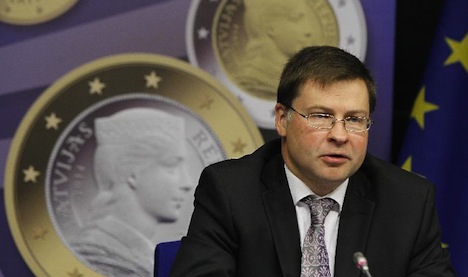
Latvia was formally accepted yesterday as the 18th member of the eurozone, meaning that on January 1, 2014, it will join Estonia as the only former Soviet republic to have adopted the euro as its currency.![]()
That might be surprising given that, in the wake of the 2008 global financial crisis and, in particular, the ensuing eurozone sovereign debt crisis, the eurozone has not been the most popular club.
Malta and Cyprus joined at the beginning of 2008 (we know how well that worked out for one of them), Slovakia joined at the beginning of 2009 and Estonia followed in 2011. But though Croatia recently joined the European Union to much fanfare, and though other Balkan nations are anxious to follow suit into the European Union, there’s little Balkan sentiment to join the eurozone, nor is there an incredible amount of appetite from other more established EU members, like the United Kingdom, Denmark or Sweden, or newer central European countries.
It’s a different story in the Baltic states, though, and it’s not hard to see why — for small states that were swept into the Soviet Union for much of the 20th century, eurozone membership is as much about geopolitical strategy as about economics. It explains why the only other European country on target to join the eurozone anytime soon is Lithuania, the third and final Baltic nation, which hopes to join the euro in January 2015.
But the specter of Russian domination doesn’t explain everything — after all, Poland is gently backing away from joining the euro, and its history with Russia is also complicated (though perhaps balanced by an equally complicated relationship with Germany). Moreover, even Latvian nationalism in the face of valid concerns about Russian influence hasn’t kept the decision to join the eurozone from becoming incredibly unpopular, and polls show that a majority of Latvian voters oppose the decision to replace the Latvian lats with the euro by a nearly two-to-one margin. Continue reading Despite risks, Latvia (and all the Baltic states) still wants to join the eurozone